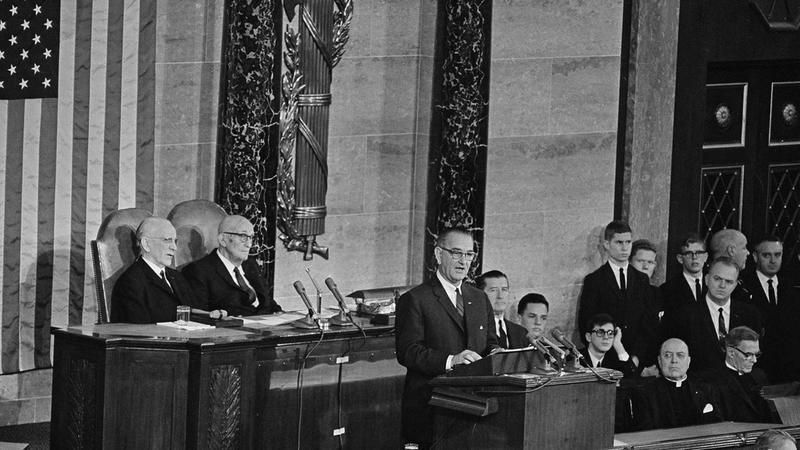President Lyndon Johnson's War On Poverty
By | September 7, 2021

On January 8, 1964, President Lyndon Johnson declared his war on poverty. As he proclaimed during his Union address, "Our aim is not only to relieve the symptoms of poverty, but to cure it and, above all, to prevent it." Depending on what side of the aisle you prefer, Johnson’s war became either “our best hopes as a people who value the dignity and potential of every human being" or "a catastrophe." Discerning who’s right grows especially difficult when you can’t even agree on how to keep score. Either way, here’s everything on the war on poverty and how either side saw it.

What Inspired The War On Poverty
America actually began marshaling its forces against hardship before Johnson took office. President Kennedy found his motivation thanks to two pieces of literature: Michael Harrington's 1962 "The Other America," and Dwight MacDonald's 13,000-word essay in the New Yorker. Each detail in length how poverty in America was far more prevalent than most believed. When JFK was assassinated, Johnson took up the cause with an even more personal fervor. As turned out Johnson’s hatred of poverty harkened back to his childhood.

A Personal War For Johnson
When Johnson sternly announced his war on poverty, his words carried came from the heart. His war on poverty meant more to him than numbers on a page. As historian Robert Caro told NPR, “(Johnson’s father) once had been a very respected state legislator and businessman, and he totally failed. And as a result, for the rest of his boyhood, Lyndon lived in a home that they were literally afraid every month that the bank might take away. There was often no food in the house, and neighbors had to bring covered dishes with food. In this little town, to be that poor, there were constant moments of humiliation for him, and insecurity. It was a terrible boyhood.”
Medicaid, Medicare, food stamps, Head Start, Job Corps VISTA, and Title 1, among many others, all started from Johnson’s war. Nixon eventually dismantled and rearranged a number of other programs but those headlining policies still remain in effect today.

Did It Work?
Now that’s a tricky question. According to a recent study from economists at Columbia, poverty significantly declined from 1967 to 2012. The study determined that poverty went from 26% to 16% over that stretch. In 2012 alone, food stamps kept 4 million people out of poverty! That program especially helps people fighting extreme poverty, which means living on less than 2$ a day. In fairness, that they aren’t the largest programs expanded during the “war.” Social Security and the Earned Income Tax Credit owned the top spots.
Opponents of the poverty war point to the official poverty rate, which did not greatly fluctuate. However, it’s worth noting that the official measure is based on the affordability of food for a family of 3 in 1963 with zero adjustments for inflation!

Why Didn’t It Work?
According to Robert Rector, Senior Research Fellow at the DeVos Center for Religion and Civil Society at The Heritage Foundation, poor people aren’t actually poor. As he wrote, “80 percent of poor households have air conditioning; nearly two-thirds have cable or satellite television; half have a personal computer; 40 percent have a wide-screen HDTV. Three-quarters own a car or truck; nearly a third has two or more vehicles.”
He goes on to say, “Ninety-six percent of poor parents state that their children were never hungry at any time during the year because they could not afford food. Some 82 percent of poor adults reported that they were never hungry at any time in the prior year. Less than 2 percent of the poor are homeless. Only 10 percent live in a mobile home.”
Instead, the war on poverty undermined “the social norms necessary for self-reliance, welfare creates a need for even greater assistance in the future.”
